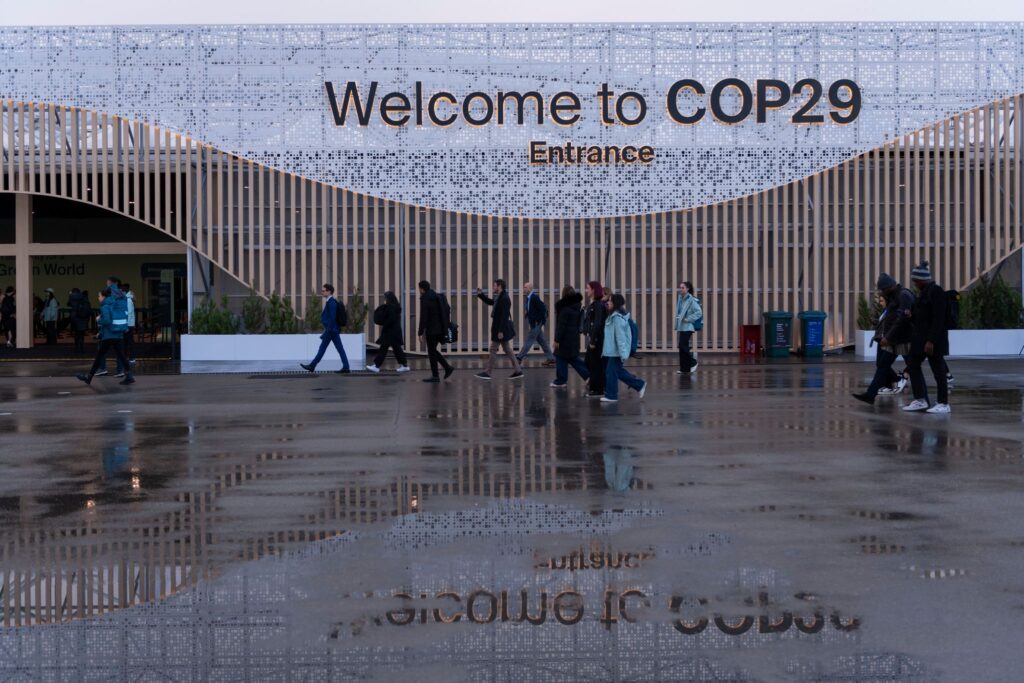COP29: Germany cannot sign “blank cheques”

At the United Nations Climate Change Conference, also known as COP29, the pressure is mounting on the industrialized nations like Germany in the dispute over trillion-dollar aid funding.
Several groups of countries — including African nations, island states and the least developed countries — have so far rejected the current draft of a closing declaration, demanding more ambitious commitments to aid funding in the coming years.
Activists marched through the conference halls late Friday evening with raised, crossed arms as a sign of protest.
Central to the dispute is the extent to which financial flows to developing countries will be increased.
The presidency proposed that primarily the industrialized countries should mobilize $250 billion annually by 2035 for action on climate change and adaptation in poorer countries, which would be about two and a half times more than is currently being provided. However, the need is also increasing significantly, without even considering an inflation adjustment.
The island states appealed to the moral conscience of those who see themselves as their partners to stand by them.
German Foreign Minister Annalena Baerbock negotiated with the island states in the evening, according to delegation sources. However, the Green politician had previously emphasized that one cannot sign “blank cheques.”
Dozens of developing states have vehemently demanded funds amounting to billions. An independent UN expert group also concluded that the need for external aid amounts to about $1 trillion per year by 2030, and even $1.3 trillion by 2035.
The total target mentioned in the five-page draft text is at least $1.3 trillion, with development banks and private financial sources, as well as additional donor countries, playing important roles.
The two-week conference, which includes tens of thousands of delegates, was meant to conclude on Friday but was extended overnight.
Climate scientist says UN climate summits have achieved nothing
German climate scientist Mojib Latif has fundamentally questioned the usefulness of the annual UN climate conferences, or Conference of the Parties (COP) as they are officially known.
“We have had 28 conferences and emissions have exploded. The COP is a spectacle that has brought nothing to the climate so far,” he told Saturday’s edition of the local German newspaper Rheinische Post.
The only good thing, he noted, is that developing countries are heard there and technology fairs are created.
The senior professor at the Geomar Helmholtz Centre for Ocean Research in the northern German city of Kiel also described it as absurd when climate conferences are held in countries that rely on oil or gas, such as recently in the United Arab Emirates or now in Azerbaijan.
He said, “These countries block the exit from fossil fuels, even though it is urgently needed.”
In his view, it would be better than annual large-scale conferences for the major emitters of climate-damaging greenhouse gases to gather in a smaller format and take action.
“China and the US together cause almost half of the global emissions, the G20 countries together 80%,” Latif said.
In the 30 years since the first climate conferences, greenhouse gas emissions have indeed continued to rise.
However, defenders of the UN summits argue that without international agreements on climate action, the increase would likely have been much more pronounced. For example, between 1990 and 2022, the emissions of the 27 EU countries decreased by around 31%, and even more significantly in Germany.
Activist Thunberg considers UN process failed
Greta Thunberg, the initiator of the Fridays for Future protests and a former icon of the climate protest movement, described the climate conference as “failing” even before its conclusion.
“The COP processes aren’t just failing us, they are part of a larger system built on injustice and designed to sacrifice current and future generations for the opportunity of a few to keep making unimaginable profits and continue to exploit planet and people,” she posted on X.
Baerbock, despite intensive negotiations on Friday evening, drew attention to the precarious human rights situation in Azerbaijan.
According to sources from the German delegation, she met media professionals and human rights activists in Azerbaijan who are subjected to state repression.
Source: dpa
